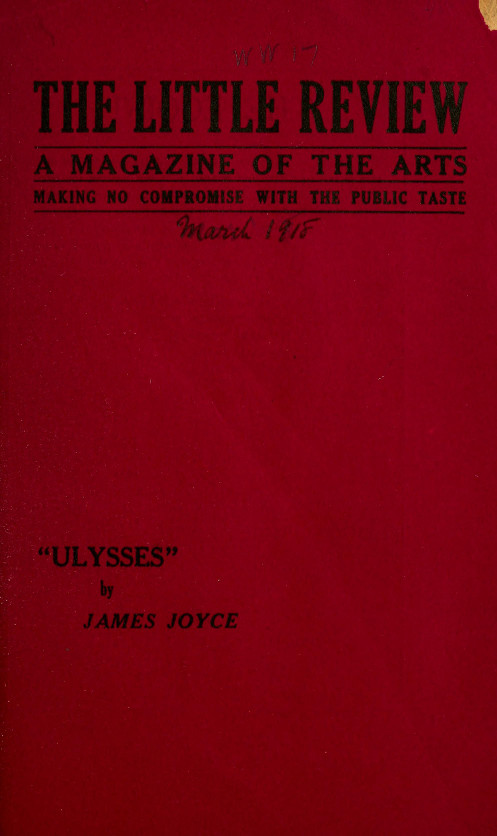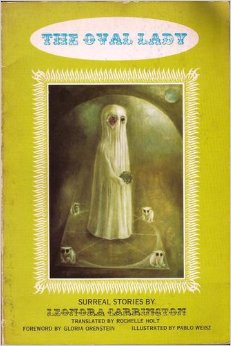James Joyce: Ulysses (1918–) [EN, PL, RO, RU, DE, CZ, ES, PT, AR]
Filed under fiction | Tags:

Ulysses was first serialised in parts in the American journal The Little Review from March 1918 to December 1920, and then published in its entirety by Sylvia Beach in February 1922, in Paris. One of the most important works of Modernist literature, it has been called “a demonstration and summation of the entire movement” (Beebe). “Before Joyce, no writer of fiction had so foregrounded the process of thinking” (Kiberd).
Ulysses chronicles the passage of Leopold Bloom through Dublin during an ordinary day, 16 June 1904 (the day of Joyce’s first date with his future wife, Nora Barnacle). The title alludes to Odysseus (Latinised into Ulysses), the hero of Homer’s Odyssey, and establishes a series of parallels between characters and events in Homer’s poem and Joyce’s novel.
Ulysses is approximately 265,000 words in length and uses a lexicon of 30,030 words (including proper names, plurals and various verb tenses), divided into eighteen episodes. Since publication, the book attracted controversy and scrutiny, ranging from early obscenity trials to protracted textual “Joyce Wars.” Ulysses‘ stream-of-consciousness technique, careful structuring, and experimental prose—full of puns, parodies, and allusions, as well as its rich characterisations and broad humour, made the book a highly regarded novel in the Modernist pantheon. In 1998, the Modern Library ranked Ulysses first on its list of the 100 best English-language novels of the 20th century. Joyce fans worldwide now celebrate 16 June as Bloomsday.
In 1919, sections of the novel appeared in the London literary journal, The Egoist, but the novel itself was banned in the United Kingdom until the 1930s. In 1920 after the US magazine The Little Review serialised a passage of the book dealing with the main character masturbating, a group called the New York Society for the Suppression of Vice, who objected to the book’s content, took action to attempt to keep the book out of the United States. At a trial in 1921 the magazine was declared obscene and, as a result, Ulysses was banned in the United States. In 1933, the publisher Random House arranged to import the French edition and have a copy seized by customs when the ship was unloaded, which it then contested. In United States v. One Book Called Ulysses, U.S. District Judge John M. Woolsey ruled on December 6, 1933 that the book was not pornographic and therefore could not be obscene, a decision that was called “epoch-making” by Stuart Gilbert. The Second Circuit Court of Appeals affirmed the ruling in 1934. Contrary to popular belief, Ulysses was never banned in Ireland. (from Wikipedia)
Review (Joseph Collins, New York Times, 1922)
Ulysses read by Donal Donnelly and Miriam Healy-Louie, 27 hours (on UbuWeb)
Film adaptation, dir. Joseph Strick, 1967, 2 hours (on YouTube), commentary (Colm McAuliffe, The Quietus)
Correspondence between three Slavic translators of Ulysses: Maciej Slomczynski, Aloys Skoumal, and Viktor Khinkis
Ulysses (English, as published in The Little Review, 1918-20, compiled by Monoskop from scans from the Internet Archive, 2013, 101 MB)
Ulysses (English, Shakespeare & Co., Paris, 1922, added on 2014-3-7)
Ulysses (English, “pirated” edition, Two Worlds Monthly magazine, New York, 1926, added on 2014-3-7)
Ulysses (English, with an Introduction by Declan Kiberd, Penguin Classics, 1960/2000, PDF), EPUB
Ulisses (Polish, trans. Maciej Słomczyński, 1969, unpaginated)
Ulysses: A Critical and Synoptic Edition (Vol. 1), Vol. 2, Vol. 3 (English, prepared by Hans Walter Gabler with Wolfhard Steppe and Claus Melchior, Garland Publishing, 1984, DJVU)
Ulise (Romanian, trans. Mircea Ivănescu, 1984, unpaginated)
Улисс (Russian, trans. Виктор Хинкис and Сергей Хоружий, 1989, unpaginated)
Ulysses (German, trans. Hans Wollschläger, 1975/1996, unpaginated)
Odysseus (Czech, trans. Aloys Skoumal, 1976, unpaginated)
Ulises (Spanish, trans. Jose María Valverde, 1978/2010, EPUB)
Ulysses (Portuguese, trans. Caetano W Galindo, 1990/2009, unpaginated)
عوليس (Arabic, 1994, trans. طه محمود طه)
Leonora Carrington: The Oval Lady: Surreal Stories (1939/1975)
Filed under fiction | Tags: · surrealism

“Leonora Carrington, British-born–Mexican Surrealist writer and artist, is the only woman whose work was included in André Breton’s Anthology of Black Humor, first published in 1939. Carrington was then twenty-two years old. The story which he chose, ‘The Debutante’, was written during 1937-38, her first two years in France, where she lived in Paris and then in St-Martin-D’Ardéche with the Surrealist artist Max Ernst. ‘The Debutante’ was one of five stories published in 1939 in her collection, The Oval Lady, along with collages by Ernst. The previous year, another story, ‘The House of Fear’, had been published as a pamphlet with Ernst’s introduction and three illustrations.” (Source).
The present volume contains six of her stories.
First published in French as La Dame Ovale, Ediciones GLM, Paris, 1939
Translated from Spanish by Rochelle Holt
Foreword by Gloria Orenstein
Illustrated by Pablo Weisz
Publisher Capra Press, Santa Barbara, 1975
ISBN 0884960366
52 pages
via UNFO
The Bestial Fictions of Leonora Carrington (Annette Shandler Levitt, Journal of Modern Literature, 1996)
The Surreal Life (Tobias Carroll, The Paris Review, 2013)
PDF (no OCR, updated on 2022-9-26)
Comments (2)Bernadette Corporation: Reena Spaulings (2005)
Filed under fiction | Tags: · capitalism, new york, situationists

“Set in post-9/11 New York City, Reena Spaulings was written by a large collective of writers and artists that bills itself as The Bernadette Corporation. Like most contemporary fiction, Reena Spaulings is about a female twenty-something. Reena is discovered while working as a museum guard and becomes a rich international supermodel. Meanwhile, a bout of terrible weather seizes New York, leaving in its wake a strange form of civil disobedience that stirs its citizens to mount a musical song-and-dance riot called “Battle on Broadway.” Fashioned in the old Hollywood manner by a legion of professional and amateur writers striving to achieve the ultimate blockbuster, the musical ends up being about a nobody who could be anybody becoming a somebody for everybody. The result is generic and perfect—not unlike Reena Spaulings itself, whose many authors create a story in which New York itself strives to become the ultimate collective experiment in which the only thing shared is the lack of uniqueness.”
Publisher Semiotext(e), 2005
Native Agents series
ISBN 158435030X, 9781584350309
216 pages
Reviews: McKenzie Wark (Nettime), Christopher Bollen (Artforum)
Commentary: Emily Pethick (Frieze), Janet Sarbanes (Afterall), Bennett Simpson (Artforum)
PDF (52 MB, updated on 2016-12-23)
Comment (0)
